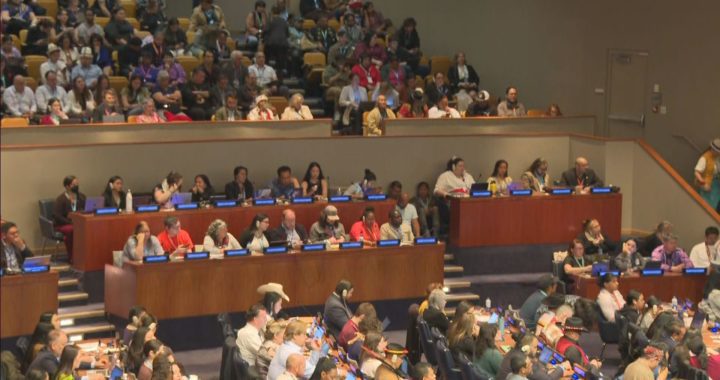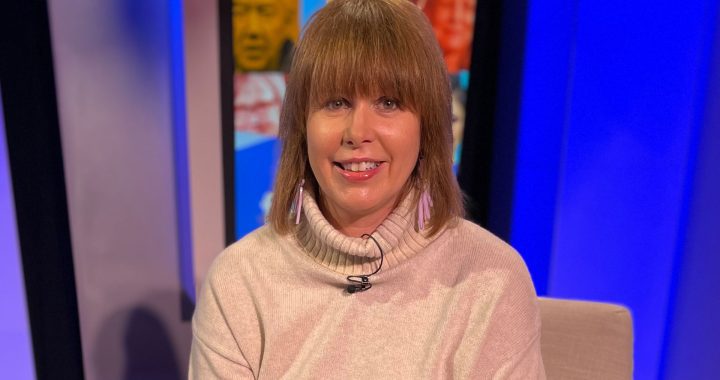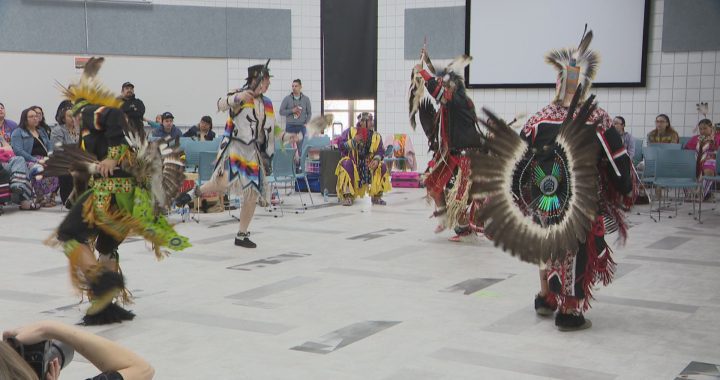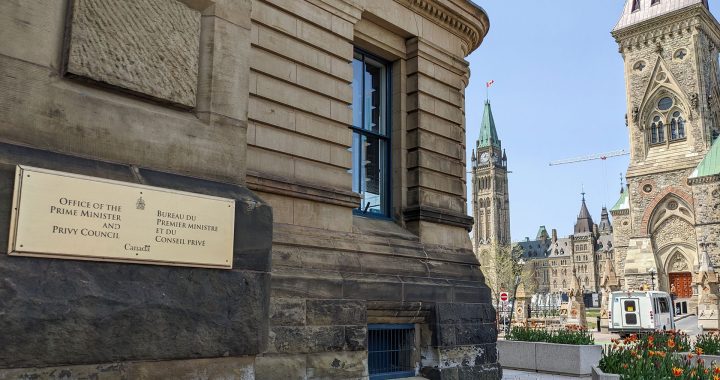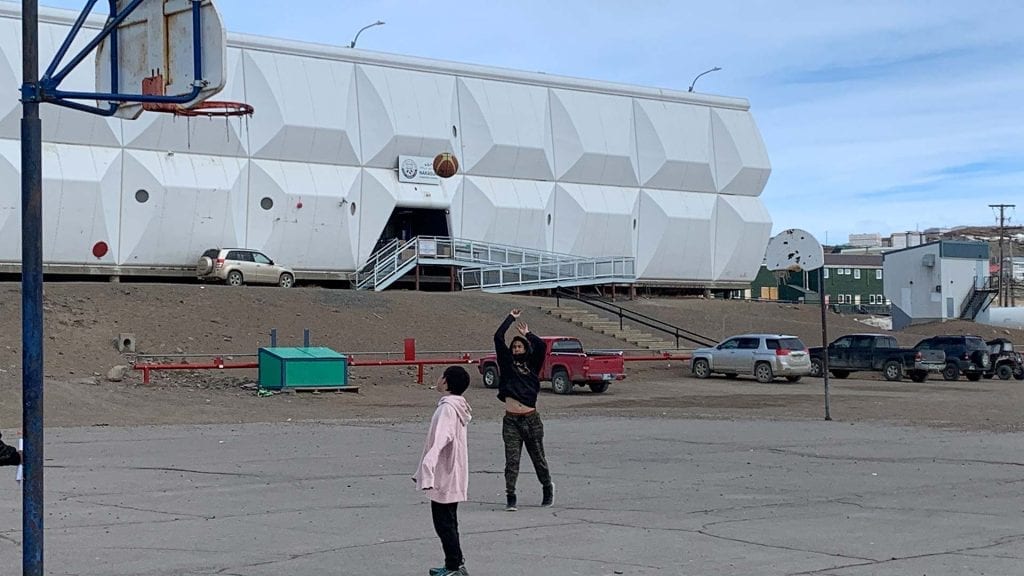
The school in Iqaluit sits empty. Photo: Kent Driscoll/APTN.
It has been over a month since Nunavut’s capitol sent students home to learn, after a COVID-19 outbreak in the city closed schools to in person learning.
Schools in Iqaluit were also closed last year in March making this the second extended stretch where Iqaluit students spent months learning at home.
Iqaluit’s teachers told APTN News, they’re at their wit’s end.
With a year to prepare, Nunavut’s response has been to invest in the Edsby online learning portal, which costs $110,000 annually.
Department of Education officials also spent $3.7 million on laptops and tablets for students to learn from, plus for internet access for those devices.
So far, those are only being used for Grade 11 and 12 students in Iqaluit.
All the rest of the students are completing paper take home packages, which are being returned to the schools at a very low rate.
Previously the Education department couldn’t tell reporters what percentage of the work was coming back to teachers.
But very recently, they revealed it was a failing grade. Fewer than half of the packages are being returned to the schools for evaluation.
The teachers have been asked by their union to not comment publicly, and are not allowed to comment to media as a condition of their employment, so APTN is protecting their identities.
As Iqaluit is a very small community, even the exact wording of a question may indicate which teacher is asking, so we are generalizing some of the questions without quoting specifically to protect their privacy.
Privately, teachers are fuming.
“These [report cards] are fluffed marks for the sake of filling a box” one teacher wrote to APTN. “We aren’t even being allowed to mark ‘unable to assess’ for those who don’t return packages,” writes another.
A third states, “The education minister is totally detached from what is happening with learning right now, he seems to think all kids are independent learning teenagers. Ask an elementary school parent how they’re doing with the packages.”
Another simply writes, “they had an entire year to get ready for this.”
Several teachers who contacted APTN had the same questions.
We used an appearance by the Education minister at a COVID-19 briefing in Iqaluit to ask some of those questions for the teachers.
To start APTN asked, with only 35 per cent of packages are being returned by students, how are teachers grading students for work they didn’t return?
Nunavut Education Minister David Joanasie said there is enough done already to mark.
“The schools, for the most part of the school year, have been open. All the course material that’s been covered to date, those assessments will continue to take place. The school closures and learning packages will be assessed and evualated as per our plans,” he said.
As a part of his answer on lack of information to create report cards, Joanasie went on to point out how taking students on land trips instead of doing school work can help them learn, a time luxury many parents in Iqaluit can’t afford while working from home and trying to teach school kids at the same time.
“The school closures has provided different opportunities for students,” explained Joanasie. “We understand they’re in different circumstances and different households have situations, but it’s an opportunity for students to reflect on and take on opportunities for personal growth, gaining more empathy in different scenarios.
“Looking at different land based learning for example, there’s opportunities where they can build on their personal skills and develop, and that will be useful for their lifetime.”
The take home packages focus on education basics, like math and reading.
The teachers asked APTN, how are the educators supposed to generate report cards marks for non-math and reading work they never assigned?
“Yes, we are focusing on and emphasizing numeracy and literacy,” said Joanasie “As well as the well-being of our students. Our teachers know their students the best. This is where our education system has to meet the students where they’re at, and we’re asking the teachers to work with the students and insure that they’re putting their best foot forward.”
When asked how grading students on work they haven’t done – or in some cases weren’t even assigned- was “meeting the students where they are,” Joanasie said, “When we say we’re meeting the students where they’re at, and looking at what’s been done to date, and reinforcing what has already been learned, emphasizing literacy and numeracy.
“Keep in mind the assessments have, all throughout the year, have been taking place, and the material that’s been covered at home.
“My staff and educators will be working with each student individually and this is where continuous progress, individualized student support systems are geared towards the individual students, and those are looked at periodically.”
Students in Iqaluit have now missed in class sessions at school for the last semester of school for two years in a row. When asked how those students are able to learn, Joanasie’s answer pivots to what they’re looking at, not what they’re doing.
“Like most students from across the globe, there’s, we recognize some opportunities are maybe missed with in class instruction,” he said. “My department is looking at ways to provide additional supports for schools that have been most impacted, significantly impacted.”
Nunavut’s teachers confirm they have had to use their own internet data to access school work, while the Education department has already purchased internet accessibility. That’s an additional cost in already expensive Nunavut.
The Education minster continues to say that isn’t an issue, as long as you are in or teaching Grade 11 or 12.
“The devices and internet capacity are targeted for Grades 11 and 12. As far as I’m concerned, these devices are also available to staff, and to support remote learning,” he said.
When asked to explain what they are doing to help teachers who aren’t using the devices for Grade 11 and 12 students, Joanasie said, “I just want to also state that the Northwestel company has approached the department to see what impacts are being seen with remote learning, and the online platform Edsby.”





